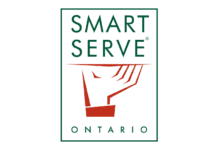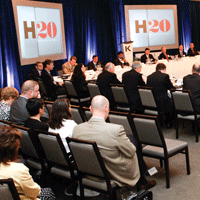When it comes to hiring employees, clearly defined traits, better screening and ppropriate feedback help ensure success
This past summer Kostuch Pub-lications hosted the H20 at Toronto’s Westin Prince Hotel to discuss the state of the foodservice and hospitality industry and dialogue on the salient issues of the day. Below is an excerpt focusing on the issue of labour. In future issues, F&H will reproduce various excerpts dealing with some of the other key trends discussed during the H20.
F&H: How does your company work towards creating and nurturing the internal leaders it needs to be successful?
Philippe Gadbois, senior vice-president, Sales and Marketing, Atlific Hotels: The first and most basic part of the answer is to identify them early. It takes a lot of discipline within the leadership team to do that because there’s always another pressure on our business. But if you do it in a disciplined and consistent manner, and provide the appropriate feedback, you will undoubtedly create loyalty and ultimately a succession plan.
One of the advantages Atlific has is that we are a manager of both branded and unbranded hotels…and there are a lot of future leaders who want to learn the best of what brands have to offer under one roof. We also operate a lot of unbranded hotels where we then apply our system to what we think is appropriate in that particular market. To identify leaders, [you need] to do it early, provide feedback, encouragement and challenge. It’s not about money.
Ian MacKay, vice-president and general manager, Aramark Health Care: We have a very heavy focus on what we call internal recruitment, which starts with succession planning at the top. It looks at the key jobs all the way down the organization chart and says for the person above that person, you are accountable for identifying a specific successor for each of those key jobs.
These succession plans are discussed in great detail by the most important people in the organization twice a year. Once those successors have been identified, it’s absolutely critical that hardwired development programs be created for each one of them that basically says: if that’s the person’s career path, what do we need to do in terms of creating the tools, the expertise and the skills in preparing him in advance. That’s really critical.
The second part of it is we are all widely distributed organizations with large employee populations. We’ve got 15,000 to 20,000 people in our organization. When I used to work in the manufacturing centre, there was a top-down mentality where you had all these corporate guys walking around in suits, and they were the future of the organization. What I find incredibly impressive about the foodservice industry is the potential of the talent pool at the lowest levels of the organization. We can’t predict the circumstances that led to our employees arriving on our doorstep and being prepared to work for $12 an hour, but we can provide a mechanism to interact with those people and sensitize our front-line managers to people who have the raw intellectual talent and the leadership skills.
I’ve got VPs working for me who started as dishwashers in our organization, and, when I go out and spend time in our units across the country, I’m constantly overwhelmed and impressed by the quality of the people.
Like most organizations, once we get into a managerial situation, we have certain core competencies that we identify and… develop. Everyone is responsible on a generic level, and the specifics vary by our line of business, but those core competencies have to be developed.
F&H: How is your company finding the labour situations these days? Are you in a hiring mode? Are you having challenges finding suitable employees?
Dave Minnett, president, Swiss Chalet and Harvey’s Rest-aurants: In a weird way, these economic times have helped us be more successful at retaining talent in our organizations. But while there might be a lot of people looking for employment, there is always the challenge of finding top talent outside of the company.
In times like these, with every hour of labour costing us more, we were in the fortunate position of investing in new systems a few years before the recession; now we’re trying to leverage them to unlock unproductive labour within each and every restaurant. What that means is getting the right employee at the right time guests are showing up. It sounds easier than it is, but it often means schedule changes and cutting out unproductive hours.
That leads to your best and brightest people in the restaurants getting the hours they want; the only way to do that is through cross-training. So we might have shrunk our staff to keep the guest experience levels intact and offered them more hours with our best people. You cross-train them, they get stronger, and it feeds the process of development.
In the old days, many of us were starving for talent and would almost take a warm body. Now, with people still wanting to come in and work at these restaurants, we’ve learned from the people already doing it best, like the learners and the achievers, and now we’ve started to change our recruitment discipline and our screening processes. We hire for attitude and what we call a hospitality gene, first and foremost; then we train for the specific roles and cross-train in many cases to make them more productive.
On the management side, it’s similar. A lot of us have had to make hard business decisions to lower our overheads and lean out our organizations. But what we did in our organization was get the best and brightest, and the people we believed had the longest and greatest potential, and as we shrunk down that pool of managerial candidates or associates, we had to put people in roles a little ahead of the preconceived notions of the timeline we had for them. They took on bigger accountabilities and in many cases we made the conscious decision to actually cross brand roles and functional opportunities, where people from finance backgrounds went into operations and vice-versa.
As a result, because we’ve kept the best, our retention, loyalty and employee satisfaction scores are through the roof, because people are getting opportunities they never thought they could get so early in their careers. It’s actually caused us to reflect differently, even in how we choose leaders of tomorrow. We’ve got some really defined leadership traits and values that we look and hunt for much earlier in the career decision-making process than we ever did before. We’ve learned a lot. Yes, we are hiring and it’s the nature of the beast, particularly at the restaurant level since you’re always going to get some transient turnover. But there’s a greater discipline and a level of screening to get the right candidates in upfront.




















